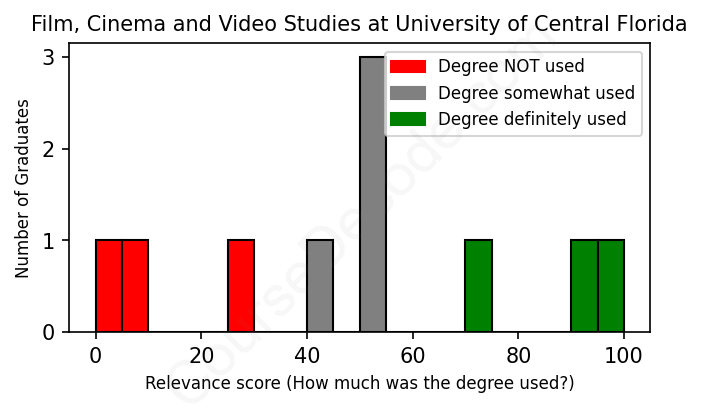
First, some facts. Of the Film, Cinema and Video Studies graduates from University of Central Florida we've analyzed , here's how many have used (or NOT used) their degree in their career:

These are estimates based on AI analysis of 10 LinkedIn profiles (see below).
The verdict? Significantly below average. Overall, with an average relevance score of 48%, Film, Cinema and Video Studies graduates from University of Central Florida have a much lower likelihood (-19%) of finding work in this field compared to the average graduate across all fields:
And for comparison, here's the chart for all profiles we've looked at across all degrees.
Also, after graduating, only 30% of these graduates have pursued further education other than another Bachelor's degree (such as a Masters degree or other), compared to the average across all profiles of 35%. This suggests a Bachelors degree is enough for most Film, Cinema and Video Studies graduates, and it's normal to look for work straight after graduation.
See the details:
|
Relevance score: 44% We think this person has gone into a career only somewhat relevant to their degree. We think this person has gone into a career only somewhat relevant to their degree.
DEGREE INFOGraduated in 2016 from University of Central Florida with a Bachelor of Arts (B.A.) in Film, Cinema and Video Studies. No other secondary education since. JOB HISTORY SINCE GRADUATIONReceptionist UCF Fairwinds Alumni Relations Jan 2016 - May 2016 Customer Relationship Management Specialist  J.P. Morgan Chase Jul 2016 - Apr 2018 Sales And Service Specialist  American Express Mar 2019 - May 2020 ABOUTEnergetic, and results oriented, great communication and relationship building skills. Strong organization and creative development, excellent written and verbal communication skills with exceptional background in customer service. Articulate, friendly and adaptive with a professional demeanor. |
The top 10 most common jobs done by the graduates we've analyzed (ranked most common to least) are:
The job profiles show that graduates from the University of Central Florida with a degree in Film, Cinema, and Video Studies have taken on a wide range of roles, but not all are directly tied to their field of study. The most common types of jobs include roles like photographers, various positions in film production (like assistants and editors), and more general roles in media and communications. Many of these entries, particularly the ones related to technical film production such as camera assistants and video editors, align closely with the skills learned in their degree program. However, quite a few grads have ventured into roles like customer service, administrative positions, or even teaching roles that don’t heavily rely on their film education.
Overall, while it's clear that some graduates are finding their way into jobs that utilize their film education—like production roles in news and media—there are a significant number that have drifted into unrelated fields. So, while a degree in Film, Cinema, and Video Studies offers a fantastic set of skills, the job market shows that not everyone is landing jobs that are squarely in the film or media industry. Many end up in roles that, while they might use some skills from their education, don’t fully engage the cinematic knowledge they spent years studying.
Here is a visual representation of the most common words in job titles for Film, Cinema and Video Studies graduates (this is across all Film, Cinema and Video Studies graduates we've analyzed, not just those who went to University of Central Florida):

Looking at the career paths of graduates with a degree in Film, Cinema, and Video Studies from UCF, you can see a mix of outcomes. Right after graduation, many of the students took roles that are somewhat related to the arts but not always directly tied to film-making. For example, some found positions in photography, media assistance, or even roles like corporate trainers and customer service representatives. This suggests that while some graduates did land jobs that leveraged their film studies background, a portion ended up in unrelated fields, perhaps out of necessity or a lack of immediate opportunities in film.
As time went on, particularly around the five to ten-year mark, there appears to be a trend of those who stuck with film-related roles making significant strides in their careers. We see some graduates transitioning into more specialized positions like video editing, journalism, and production roles. Despite the initial challenges, it looks like many found their niches as they gained experience, with some even moving into senior roles in companies that focus on creative content. However, it’s also clear that not all graduates are directly in film; some pursued very different paths in fields like marketing, education, and communications. So overall, while there are shining examples of star careers in film, there’s definitely a chunk who took a more winding road in their professional journeys, which is pretty typical for any degree in the arts.”
Honestly, a Bachelor’s degree in Film, Cinema, and Video Studies can be a mixed bag in terms of difficulty. It’s not the hardest degree out there, but it's not exactly a walk in the park either. You’ll be diving into a lot of projects, writing, and really getting into the nitty-gritty of film theory and production techniques. There are deadlines to meet, group projects to manage, and those late-night edits can be a bit stressful. Plus, you’ll need a creative mindset and a willingness to collaborate with others. So, while it might be easier than something like engineering or physics, it still requires dedication and effort if you want to make the most of it.
Most commonly, in the LinkedIn profiles we've looked at, it takes people 4 years to finish a Bachelor degree in Film, Cinema and Video Studies.
So, looking at these graduates from UCF, it seems like they’ve had a pretty varied journey in terms of jobs and income. Many of them started with lower-paying positions, like photographers and receptionists, which is pretty common when trying to break into creative fields. Over time, though, some have moved into better-paying roles like corporate trainers, video editors, and managers, suggesting they’re climbing the ladder, which is great. However, there are still a good number juggling freelance gigs or lower-level positions, so it seems like while some are likely making decent money now, others are still figuring things out. In the end, it’s an interesting mix—some seem to be doing well, but there's definitely a struggle for a few others in the industry.
Here is a visual representation of the most common words seen in the "about" section of LinkedIn profiles who have a Bachelor degree in Film, Cinema and Video Studies (this is across all Film, Cinema and Video Studies graduates we've analyzed, not just those who went to University of Central Florida). This may or may not be useful:

Here are all colleges offering a Bachelor degree in Film, Cinema and Video Studies (ordered by the average relevance score of their Film, Cinema and Video Studies graduates, best to worst) where we have analyzed at least 10 of their graduates:
| College | Score | Count |
|---|---|---|
 New York University New York University
|
73 | 17 |
 Full Sail University Full Sail University
|
57 | 34 |
 Georgia State University Georgia State University
|
56 | 15 |
 San Francisco State University San Francisco State University
|
51 | 21 |
 Columbia College Chicago Columbia College Chicago
|
50 | 22 |
 University of Central Florida University of Central Florida
|
48 | 10 |
 California State University, Fullerton California State University, Fullerton
|
47 | 11 |
 University of North Carolina at Wilmington University of North Carolina at Wilmington
|
31 | 10 |